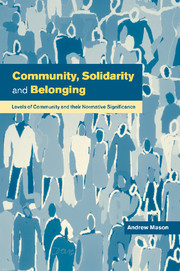Book contents
- Frontmatter
- Contents
- Acknowledgements
- Introduction
- Part 1 Community and its value
- Part 2 Political community in a culturally diverse society
- 3 Liberal political community and illiberal minorities
- 4 Republican political community
- 5 National community: the benefits of a sense of belonging together
- 6 Multicultural education for an inclusive political community
- Part 3 Political community and the limits of global community
- Conclusion
- Bibliography
- Index
5 - National community: the benefits of a sense of belonging together
Published online by Cambridge University Press: 22 September 2009
- Frontmatter
- Contents
- Acknowledgements
- Introduction
- Part 1 Community and its value
- Part 2 Political community in a culturally diverse society
- 3 Liberal political community and illiberal minorities
- 4 Republican political community
- 5 National community: the benefits of a sense of belonging together
- 6 Multicultural education for an inclusive political community
- Part 3 Political community and the limits of global community
- Conclusion
- Bibliography
- Index
Summary
In this chapter I shall consider a challenge which applies not only to the dominant liberal conception of political community but to other liberal conceptions as well, and which maintains that a stable liberal political community cannot be realized unless citizens share a national identity – in effect, form a national community. According to this view, when conflicts arise in a liberal polity between national community and communities below the level of the state, they should be resolved in favour of the former. In the version I shall consider, this challenge comes from a perspective friendly to liberalism, which I shall call liberal-nationalism. The charge it makes against anti-nationalist liberals is that they fail to appreciate what is required in order to realize their ideals of political community, and as a result are too permissive towards communities below the level of the state.
Many anti-nationalist liberals have feared that fostering a shared national identity would require assimilating minority cultures, which can only be achieved (if it can be achieved at all) by oppression. This does not meet the liberal-nationalist's argument that a liberal political community cannot be sustained unless citizens share a national identity, but it explains why, even in the light of it, many liberals have been reluctant to support policies for fostering a national identity.
- Type
- Chapter
- Information
- Community, Solidarity and BelongingLevels of Community and their Normative Significance, pp. 115 - 147Publisher: Cambridge University PressPrint publication year: 2000



